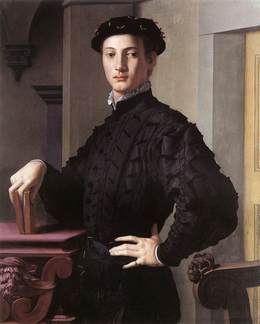By Christian Smith
The Liberal Arts are both practical and efficient—as showcased by their scholars who have achieved timeless success. In the Sixteenth Century, one such individual, Baldassare Castiglione, argued that interdisciplinary education was crucial to advancement at court (and in the greater world). His work, The Book of the Courtier, set the educational standard that would be followed by military and noble ranks—and ultimately (via public education) the masses.
In The Book of the Courtier (1528), Castiglione argues that a proper gentleman is both a warrior as well as a man whose knowledge extends beyond the field of battle, “[The Count] I blame the French for believing that letters are harmful to the profession of arms, and I maintain myself that it is more fitting for a warrior to be educated than anyone else” (93). Castiglione’s brilliance allowed him access to Duchess Elisabetta Gonzaga’s court—a hotbed of political intrigue and intellectual/literary activity. He was the innovator of a new mindset, which combined traditional, chivalric ideas with the emerging Studia Humanitatis. The fashionable Court of Urbino taught that a gentleman had to be a warrior and a scholar. He must be accomplished—in the martial arts as well as history, humanities, rhetoric, poetry, music, and drawing. This changed the Western cultural landscape for the better. As noted to Emilia Pia, “One would be hard put to it to find anywhere in Italy an equal number of knights as out- outstanding and skilled in so many different things, apart from their main profession” (50). The scholastic brilliance of the era would spur on more change. For example, Western nations often turned to diplomacy rather than open warfare after this period.
The Humanist spirit: Wealth and class continued to shape a man’s status and support the prosperous and pompous; however, the new courtier’s knowledge, ability, and even elegance contributed to his social success. This idea is a founding component of our own society. This mindset led to an acceptable and unaccepted norm for host, hostess, and courtiers, as stated in The Book of the Courtier, “I should like our courtier to be a more than average scholar, at least in those studies which we call the humanities…but if because of his other activities or through lack of study he fails to achieve a commendable standard in his writing, then he should take pains to suppress his work” (90). Things had (indeed) changed.
In conclusion, Baldesar Castiglione led forth a massive social revival with emphasis on the Liberal Arts as foundational. He demands both military prowess and intellectual complexity. His own worldly experience and interdisciplinary brilliance made him a much requested guest in Italian court circles. He created a ripple effect on society as nobles adopted his focus on the Liberal Arts. Castiglione would initiate a resounding change in political and class mannerisms still pertinent today.
Works Cited
Castiglione, Baldassare. The Book of the Courtier. London: Dent, 1974.
Image: Portrait of a Young Man with a Book by Bronzino via Wikimedia Commons

